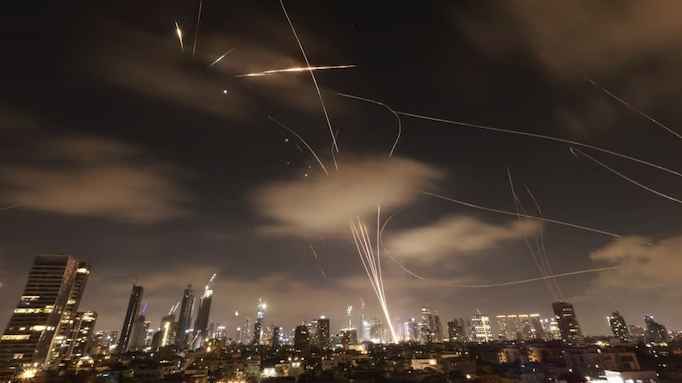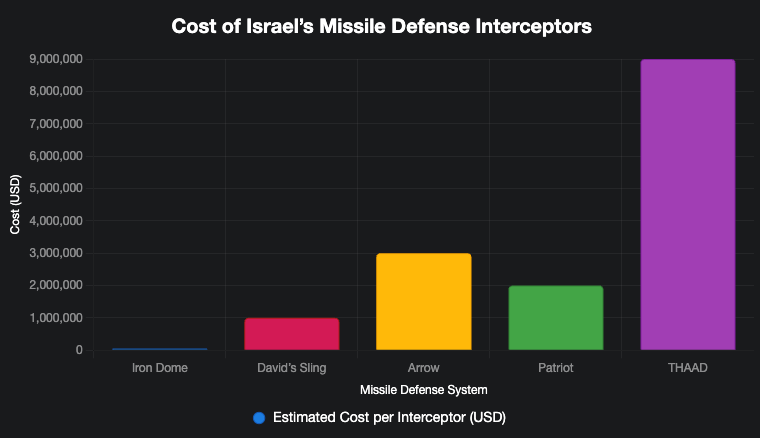Missile defense costs Israel roughly $285 million per day: System could collapse in 12 days

The High Cost of Defense
Israel’s missile defense systems, once seen as nearly impenetrable, are now under immense pressure.
The ongoing conflict with Iran has pushed these systems to their limits. Costs have reached an estimated $285 million per day.
This staggering expense, combined with dwindling interceptor stocks, has sparked fears that the entire defense network could collapse within days.
The situation is critical, with both financial and strategic implications.

The Current Situation: Missile Exchanges and Casualties
Since hostilities escalated in June 2025, Iran has launched over 400 ballistic missiles at Israel.
Iran’s total arsenal is estimated at 2,000 missiles.
Israel’s multilayered defense system—comprising Iron Dome for lower-altitude threats, David’s Sling, Arrow, Patriot, and THAAD (provided by the U.S.)—has intercepted over 90% of these missiles.
However, 35 missiles have made impact, causing 24 deaths and over 600 injuries, according to Israeli officials. Iran’s strategy of smaller, frequent barrages is testing Israel’s endurance.
| Defense System | Target | Estimated Cost per Interceptor (USD) |
|---|---|---|
| Iron Dome | Short-range rockets | 50,000 |
| David’s Sling | Mid-range missiles | 1,000,000 |
| Arrow | Ballistic missiles | 3,000,000 |
| Patriot | Aircraft, missiles | 2,000,000 |
| THAAD | Ballistic missiles | 9,000,000 |
The Financial Burden: $285 Million Per Day
The cost of maintaining this defense is astronomical.
Israeli financial daily The Marker reports that nightly missile defense operations can cost up to 1 billion shekels, roughly $285 million.
Each Arrow interceptor, a key component, costs $3 million.
At the current rate of Iranian missile fire, Israel’s interceptor stockpile is projected to last only 10 to 12 more days without resupply.
This financial strain is unsustainable, raising questions about long-term viability.

The Risk of Collapse: Running Out of Interceptors
The potential collapse of Israel’s missile defense system is a looming threat.
If interceptor stocks run out, Israel may be forced to ration munitions, intercepting fewer missiles and leaving the country more vulnerable.
This scenario echoes the 2014 conflict with Hamas, when Israel sought a ceasefire just days before exhausting its air defense interceptors.
The current situation is more dire, with Iran’s arsenal far larger and more advanced.
Reports indicate that Israel may need to start rationing as early as this week.
International Support: U.S. and Allies
The United States has been a critical ally, providing financial and military aid.
U.S. Navy destroyers have been intercepting missiles, and the deployment of THAAD systems in October 2024 has bolstered Israel’s defenses.
THAAD can identify targets up to 3,000 km and intercept missiles at altitudes up to 150 km.
However, even with this support, the sustainability of the system remains uncertain.
The Pentagon has increased assistance, but the volume of Iranian attacks is testing both Israeli and U.S. capabilities.

Expert Opinions: Assessing the Defense Systems
Security experts have both praised and warned about Israel’s defensive capabilities.
Dr. Yehoshua Kalisky from the Institute for National Security Studies described the performance as “outstanding”, noting that it prevented “far greater destruction.”
He estimated that Israel intercepted approximately 95% of Iranian ballistic missiles as of June 15, 2025.
However, Behnam Ben Taleblu from the Foundation for Defense of Democracies highlighted limitations, estimating that 20 of 380 Iranian ballistic missiles made it through.
He noted Iran’s strategy of targeting civilian centers and using smaller attack waves, which could further strain Israel’s defenses.
Official Statements: From Israel and Iran
Israeli officials have expressed confidence while acknowledging challenges.
An anonymous military official stated that Israel has taken out more than 50% of Iran’s launchers, making it harder for Iran to fire toward Israel.
However, they noted that Iran retains significant capabilities. The IDF is investigating a possible issue with interceptors, stating, “The possibility that there was an issue with the interceptor is being looked into”.
An Israeli Air Force pilot involved in strikes on Iran shared, “We’re destroying precision missiles aimed at our hospitals, at our homes”.
Iran, meanwhile, has condemned Israeli attacks, with UN experts urging an end to hostilities.
The Path Forward: Prolonged Conflict or Resolution?
Israel is bracing for a potentially long war. Brig. Gen. Effie Defrin, IDF’s chief spokesman, reported that the Chief of Staff has instructed the army to prepare for a “prolonged campaign”.
With daily defense costs at $285 million and the risk of system collapse, the pressure for a swift resolution is mounting.
Israel’s airstrikes on Iran have targeted nuclear facilities and missile capabilities, signaling a broader strategic goal.
Iran continues to launch missiles, testing Israel’s defenses to their breaking point. Diplomatic efforts are urgently needed to prevent further escalation.














